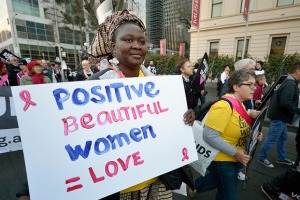
As researchers, activists and policy makers prepare to leave Melbourne at the conclusion of the 20th International AIDS Conference, they possess a new confidence that advances in treatment can mean an eventual end to the AIDS epidemic. Yet new testing mechanisms, antiretroviral medications, and government funding strategies alone won’t be enough to transform HIV infection from a global public health emergency to a manageable chronic disease. Religious leaders who came to Melbourne warn that making real the refrain of “nobody left behind” will also mean recognizing that faith-based groups must continue to play a major role in the comprehensive struggle against the virus.
Luiz Loures, the UNAIDS deputy executive director of program, told religious leaders on the eve of the conference that a complete response to the epidemic won’t be possible without the continuing involvement of faith-based groups.
“We have the tools. We have the science that we need. Yet there is no way to treat people if they have no access to care because they are afraid, or because they are women, or because they are a migrant, or because they need to hide to survive,” Loures said.
The global AIDS ambassador of the U.S. government, Deborah Birx, told the faith leaders in Melbourne that their “compassion and passion for this work continue to be the heartbeat of the response to HIV,” yet she also expressed concern about the role of some religious groups in fomenting discrimination in Africa, where anti-gay legislation has led to violence against sexual minorities.
The Rev. Michael Schuenemeyer, a pastor in the United States and executive director of the United Church of Christ HIV and AIDS Network, said responsible faith leaders need to put their religious houses in order if nobody is going to be left behind.
“Some religious leaders and communities are indeed part of the problem. That’s a challenge for us. We need to create spaces where we can engage in dialogue, and appeal to the sense of empathy and compassion that almost every faith community carries. We need to hold each other accountable, and that may require some of us to more boldly confront the negative rhetoric that causes harm, puts people at risk, and supports laws that criminalize HIV, sexuality and gender identity,” he said.
The Rev. Phumzile Mabizela, a South African Presbyterian minister, said the anti-gay legislation is setting back the struggle against AIDS.
“The new laws and even the discussion of the new laws have promoted a lot of fear. People are scared of going to clinics or hospitals. They don’t know whom to trust,” said Mabizela, the executive director of the International Network of Religious Leaders Living with or Personally Affected by HIV and AIDS (INERELA+).
“We as a faith community should stand up and fight against this. It puts the lives of our most at-risk communities even more at risk. The more we discriminate against them, the more we stigmatize them, and the less likely they are to come forward for the resources they need.”
While homophobia is provoking violence in some areas, complacency has become a common problem in other parts of the world, primarily in the global north.
“In the United States, western Europe, Australia and New Zealand, complacency has become a problem,” said Father Robert Vitillo, a special advisor on HIV and AIDS to Caritas Internationalis. “Because we have relatively low levels of infection, and most people who are positive are on medications, we think the problem is solved. But that’s not the case. High income countries have had a steady rate of new infections for several years, yet they’re lecturing everyone else on how to reduce their new infections.”
Vitillo said this “lack of awareness” takes on even more dangerous overtones when PrEP becomes available, a reference to Pre-Exposure Prophylaxis. “With PrEP people can develop a sense that they don’t have to worry about infection anymore. So they can have all the sexual encounters they want, or inject any drugs they want, with a perception that they’re protected from HIV. But there are other diseases that they can acquire. We’re in danger, but there’s widespread denial about the danger,” he said.
According to Ulysses Burley III, a U.S. physician who is a leader for HIV care within the Evangelical Lutheran Church in America, young people in the United States, particularly African-American young men who have sex with men, are at a particular risk of being left behind in the struggle against HIV and AIDS.
“If Black America were its own country, it would be ranked 16th in the world in terms of HIV infections, above countries like Botswana and Ethiopia and Haiti. So as we discuss the global epidemic, I don’t want the US epidemic to be left behind, especially young African-American men who have sex with men,” he said.
Insuring their inclusion in the HIV response means churches have to establish new ways of reaching young people. “You can’t do outreach to a population to which you don’t have access,” Burley said. “It also means the church has to deal better with sex and sexuality, not as a separate theme, but as something integral to our spirituality.”
Changes in international funding for HIV testing, treatment and education will jeopardize continued progress against the virus, many religious workers in Melbourne warned. Of particular concern is a shift in funding, especially by the U.S. government, away from AIDS programs in countries where growing economies have moved the nations from being considered “poor” to now being labeled “middle income.”
Vitillo said that’s a mistake.
It’s true that a small number of people are getting richer and richer, and a country’s GNP may have risen into the middle income category, but the situation of the poor is often worse. And some governments claim they can handle all of their own health care, but they really can’t, and what they do provide they tend to concentrate in the large cities. As a result, the churches that have been providing care in rural areas have less access to funding today,” he said.
Assuring that nobody gets left behind, Vitillo said, will require fundamental policy shifts.
“It means much more equitable sharing of resources. We keep hearing there’s no money. But there is plenty of money. Governments just have the wrong priorities in how to spend it. If we took some of the funding that now goes to weapons and spent it in the struggle for development, we could take care of HIV and AIDS much more quickly,” he said.
Financial decisions at national levels are also increasing the risk of leaving whole segments of the population behind. In India, for example, the government this year ended 13 years of collaboration and funding for Catholic mission hospitals and community care centers.
“The government decided to close these and announced that people should go to the government health facilities. But those aren’t really capable of handling the complex multiple needs of HIV-infected people, especially complicated cases and those in the end stages of care,” said Father Mathew Perumpil, who coordinates HIV work for the Catholic Church in India.
Perumpil said the church decided to keep the centers open, even without government funding.
“We were the first to open our doors to people living with HIV. We didn’t start these programs because of the government. We started them because of the people. So many of the centers remain open and continue providing services. But that puts us in a huge bind. Where do the resources come from? The patients can’t pay,” he said.
While the Indian government continues providing antiretroviral medications at no cost, church-run hospitals and centers are now struggling to raise their own funding for other services.
Perumpil said the people most at risk of being left behind in the HIV response in India are women living in the countryside.
“The poor, the people without voices, are always the ones who are left behind. They aren’t the key populations that get lots of attention and money from the international community. They are poor women in villages who still know nothing about HIV and end up getting infected by their husbands who are working elsewhere. They are the people who are still left behind,” the priest said. “You don’t see them in Melbourne because this conference is too expensive for any of them to attend. They are marginalized not because of their sexual orientation, but simply because they’re poor. The church is close to them, and the church has to do a lot more in solidarity with them.”
Despite the work of faith-based organizations in response to HIV around the world, the groups have always received a mixed reaction at the international AIDS conferences. While there has always been appreciation from many for the faith groups’ commitment to caring for affected people long before it became fashionable, some have wanted to accuse all religious groups of fomenting stigma and discrimination.
It was often a lively conversation. Yet according to Sara Speicher, the interim executive director of the Ecumenical Advocacy Alliance (EAA), such controversy has been replaced with silence.
“In the speeches here about human rights there has been no mention of faith-based organizations,” she said. “Whatever your opinion is about this, faith-based groups were involved from the beginning in the development of the international human rights framework and many see rights as integral to their witness. At the same time, we know that some religious leaders and communities have problems with rights-based language and activism. One way or another, these issues need to be recognized, and we have to be involved in these discussions.”
Speicher said she knew of several EAA members who took the issue up with presenters, who acknowledged, after the fact, the need to include everyone in the conversation. “But it didn’t seem to occur to them ahead of time,” Speicher said. “If we’re going to make sure that faith-based groups can continue our struggle that nobody gets left behind in the response to HIV, we’re also going to have to make sure our own voices are heard. That’s something we will have to work on, as we look towards AIDS 2016 in Durban, South Africa.”
By Paul Jeffrey
